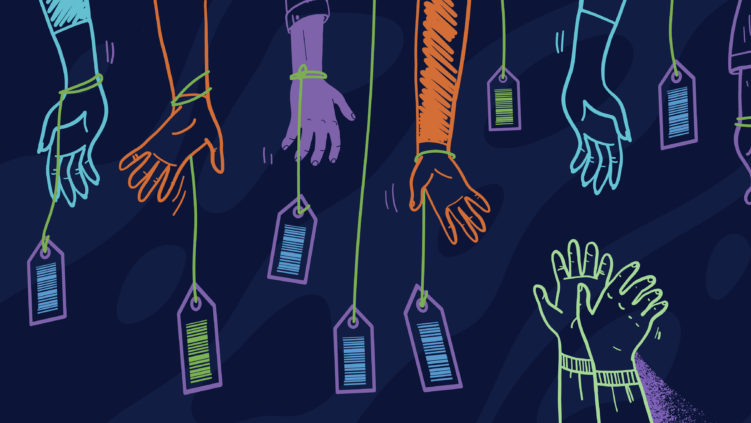The Knoble Report On Human Scam Trafficking
By The Knoble & SCARS Editorial Team – Society of Citizens Against Relationship Scams Inc.
From Fake Job Ads to Human Trafficking: The Horrifying Reality of the Human Trafficking Scam Trade
Human Trafficking Scam Trade preys on vulnerable individuals trapping victims in a web of human trafficking, coercion, fraud, and cryptocurrencies. Our new publication, in collaboration with The Mekong Club, Anti-Human Trafficking Intelligence Initiative, and Humanity Research Consultancy, sheds light on the shocking tactics used by criminal networks and highlights the complexities surrounding detection and prevention. Discover the hidden tactics involving fraud, money laundering, human trafficking, and cryptocurrencies, and learn how you can prevent this critical issue.
SCARS is a proud member of the Knoble.
Introduction To The Human Trafficking Scam Trade
In the fight against modern slavery and trafficking, the private sector plays a crucial role as it serves as the primary channel for 70% of the flows of illicit activities. Money is at the core of this insidious crime, flowing in and out of different countries through various channels. Modern-day slavery generates an estimated US$150 billion in profits each year, a significant portion of which is being funnelled into the global financial system.
The financial services industry, being at the forefront of this system, has a unique opportunity to detect suspicious activities and trends associated with money laundering and slavery.
Proper training can empower this industry to identify new forms of financial fraud, thereby reducing the risks associated with illegal and fraudulent businesses. As such, the financial services industry can take a proactive stance in the fight against modern slavery and trafficking.
According to estimates by the United Nations Interagency Project on Human Trafficking (UNIAP), someone becomes a victim of modern slavery every four seconds, with the criminal industry that fuels this practice earning over US$285,000 every minute. These statistics highlight the alarming scale and global reach of modern slavery and trafficking, which reduces human beings to mere commodities.
These crimes are not confined to any specific geographic region or industry; rather, they are prevalent across supply chains and affect individuals in both developed and developing nations.
The immense profits generated by modern slavery and human trafficking make it one of the world’s most lucrative criminal enterprises, second only to the drug trade. These profits are derived from the exploitation of an estimated 50 million people, making it a highly pervasive industry.
Due to its reliance on access to financial institutions, modern slavery and trafficking represent not only a destination for illicit proceeds but also a conduit for financing the entire process. Financial institutions are increasingly recognising their pivotal role in combating modern slavery and trafficking and are actively exploring ways to disrupt the flow of money that sustains this practice.
While the goal of completely eradicating modern-day slavery may be unrealistic, efforts to cut off its financial lifeline must not falter. By limiting the funds that support these heinous practices, we can help reduce the prevalence of modern slavery and human trafficking.
Recognition of modern slavery and human trafficking issues linked to cryptocurrencies is an emerging trend first seen toward the end of 2022. Traditional financial institutions need to be aware of how this could be used to launder money, and more specifically how it’s linked to modern slavery and human trafficking. So, what are cryptocurrencies and how are they used to launder money?
Cryptocurrencies are a type of digital asset designed to work as a medium of exchange. They use cryptography to secure and verify transactions as well as to control the creation of new units. Since cryptocurrencies are decentralised and operate on a distributed ledger called the blockchain, this means that transactions are recorded across a network of computers, making them difficult to manipulate or hack. Although cryptocurrencies are commonly used for legitimate purposes such as purchasing goods and services, investing, and sending money to family and friends, they are also used for illicit
activities such as money laundering. Cryptocurrencies can be used to launder money because they offer a level of anonymity and can be easily transferred across borders without the need for intermediaries like banks.A common method of using cryptocurrencies to launder money is called the ‘mixing’ process. Mixing involves combining funds from multiple transactions or wallets and then redistributing them to new wallets. This can make it difficult to trace the origin of funds and link them to criminal activity. Another method of using cryptocurrencies for money laundering is ‘tumbling’ services. Tumbling services are online platforms that offer to break up large cryptocurrency transactions into smaller ones, which are then sent to multiple recipients to obscure the original source of the funds.
Other methods include unregulated exchanges, peer-to-peer (P2P), prepaid cards, gaming sites and ATMs. Typically, with almost all the
methods mentioned, transactions from criminals can then be used to launder money by converting the cryptocurrencies into cash or other assets.The methods mentioned above are just some of the tactics used to conduct the pig butchering scams that commonly emerge from the scamming compounds. Victims in the compounds are often recruited overseas via fake job advertisements, enticed by high salaries, free flights, dream jobs and the opportunity to experience a new country. However, upon arrival they will be trafficked to a compound and forced to defraud individuals worldwide, including those in the United States, Canada, Europe, and other developed nations. Those who refuse may be subjected to physical violence, food deprivation, electric shocks and consumption of illicit drugs to keep them from sleeping and continue scamming (Podkul and Lui, 2022).
Read more in the PDF below …
More ScamsNOW.com Articles
-/ 30 /-
What do you think about this?
Please share your thoughts in a comment below!
SCARS LINKS: AgainstScams.org RomanceScamsNOW.com ContraEstafas.org ScammerPhotos.com Anyscam.com ScamsNOW.com
reporting.AgainstScams.org support.AgainstScams.org membership.AgainstScams.org donate.AgainstScams.org shop.AgainstScams.org
youtube.AgainstScams.org linkedin.AgainstScams.org facebook.AgainstScams.org
TABLE OF CONTENTS
CATEGORIES
![NavyLogo@4x-81[1] Human Scam Trafficking - The Knoble Report](https://scamsnow.com/wp-content/uploads/2025/04/NavyLogo@4x-811.png)
ARTICLE META
Important Information for New Scam Victims
- Please visit www.ScamVictimsSupport.org – a SCARS Website for New Scam Victims & Sextortion Victims.
- SCARS Institute now offers its free, safe, and private Scam Survivor’s Support Community at www.SCARScommunity.org – this is not on a social media platform, it is our own safe & secure platform created by the SCARS Institute especially for scam victims & survivors.
- SCARS Institute now offers a free recovery learning program at www.SCARSeducation.org.
- Please visit www.ScamPsychology.org – to more fully understand the psychological concepts involved in scams and scam victim recovery.
If you are looking for local trauma counselors, please visit counseling.AgainstScams.org
If you need to speak with someone now, you can dial 988 or find phone numbers for crisis hotlines all around the world here: www.opencounseling.com/suicide-hotlines
Statement About Victim Blaming
Some of our articles discuss various aspects of victims. This is both about better understanding victims (the science of victimology) and their behaviors and psychology. This helps us to educate victims/survivors about why these crimes happened and not to blame themselves, better develop recovery programs, and help victims avoid scams in the future. At times, this may sound like blaming the victim, but it does not blame scam victims; we are simply explaining the hows and whys of the experience victims have.
These articles, about the Psychology of Scams or Victim Psychology – meaning that all humans have psychological or cognitive characteristics in common that can either be exploited or work against us – help us all to understand the unique challenges victims face before, during, and after scams, fraud, or cybercrimes. These sometimes talk about some of the vulnerabilities the scammers exploit. Victims rarely have control of them or are even aware of them, until something like a scam happens, and then they can learn how their mind works and how to overcome these mechanisms.
Articles like these help victims and others understand these processes and how to help prevent them from being exploited again or to help them recover more easily by understanding their post-scam behaviors. Learn more about the Psychology of Scams at www.ScamPsychology.org
SCARS INSTITUTE RESOURCES:
If You Have Been Victimized By A Scam Or Cybercrime
♦ If you are a victim of scams, go to www.ScamVictimsSupport.org for real knowledge and help
♦ SCARS Institute now offers its free, safe, and private Scam Survivor’s Support Community at www.SCARScommunity.org/register – this is not on a social media platform, it is our own safe & secure platform created by the SCARS Institute especially for scam victims & survivors.
♦ Enroll in SCARS Scam Survivor’s School now at www.SCARSeducation.org
♦ To report criminals, visit https://reporting.AgainstScams.org – we will NEVER give your data to money recovery companies like some do!
♦ Follow us and find our podcasts, webinars, and helpful videos on YouTube: https://www.youtube.com/@RomancescamsNowcom
♦ Learn about the Psychology of Scams at www.ScamPsychology.org
♦ Dig deeper into the reality of scams, fraud, and cybercrime at www.ScamsNOW.com and www.RomanceScamsNOW.com
♦ Scam Survivor’s Stories: www.ScamSurvivorStories.org
♦ For Scam Victim Advocates visit www.ScamVictimsAdvocates.org
♦ See more scammer photos on www.ScammerPhotos.com
You can also find the SCARS Institute’s knowledge and information on Facebook, Instagram, X, LinkedIn, and TruthSocial
Psychology Disclaimer:
All articles about psychology and the human brain on this website are for information & education only
The information provided in this and other SCARS articles are intended for educational and self-help purposes only and should not be construed as a substitute for professional therapy or counseling.
Note about Mindfulness: Mindfulness practices have the potential to create psychological distress for some individuals. Please consult a mental health professional or experienced meditation instructor for guidance should you encounter difficulties.
While any self-help techniques outlined herein may be beneficial for scam victims seeking to recover from their experience and move towards recovery, it is important to consult with a qualified mental health professional before initiating any course of action. Each individual’s experience and needs are unique, and what works for one person may not be suitable for another.
Additionally, any approach may not be appropriate for individuals with certain pre-existing mental health conditions or trauma histories. It is advisable to seek guidance from a licensed therapist or counselor who can provide personalized support, guidance, and treatment tailored to your specific needs.
If you are experiencing significant distress or emotional difficulties related to a scam or other traumatic event, please consult your doctor or mental health provider for appropriate care and support.
Also read our SCARS Institute Statement about Professional Care for Scam Victims – click here
If you are in crisis, feeling desperate, or in despair, please call 988 or your local crisis hotline – international numbers here.
More ScamsNOW.com Articles
A Question of Trust
At the SCARS Institute, we invite you to do your own research on the topics we speak about and publish. Our team investigates the subject being discussed, especially when it comes to understanding the scam victims-survivors’ experience. You can do Google searches, but in many cases, you will have to wade through scientific papers and studies. However, remember that biases and perspectives matter and influence the outcome. Regardless, we encourage you to explore these topics as thoroughly as you can for your own awareness.



![Human Scam Trafficking - The Knoble Report 2 Talking To Kids/Youth About Online Risk [VIDEO] - on ScamsNOW.com](https://scamsnow.com/wp-content/uploads/2023/08/shutterstock_659410001.jpg)





















![scars-institute[1] Human Scam Trafficking - The Knoble Report](https://scamsnow.com/wp-content/uploads/2025/04/scars-institute1.png)

![niprc1.png1_-150×1501-1[1] Human Scam Trafficking - The Knoble Report](https://scamsnow.com/wp-content/uploads/2025/04/niprc1.png1_-150x1501-11.webp)